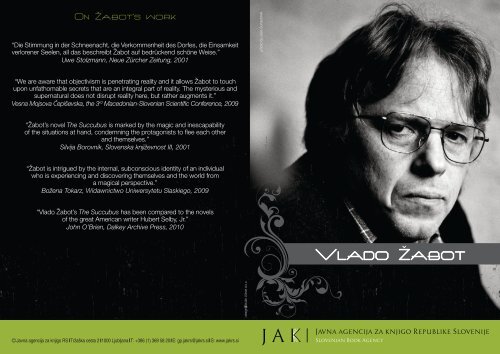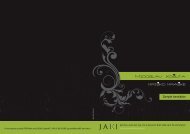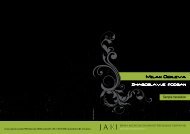On Zabot´s work
On Zabot´s work
On Zabot´s work
Create successful ePaper yourself
Turn your PDF publications into a flip-book with our unique Google optimized e-Paper software.
<strong>On</strong> <strong>Zabot´s</strong> <strong>work</strong><br />
“Die Stimmung in der Schneenacht, die Verkommenheit des Dorfes, die Einsamkeit<br />
verlorener Seelen, all das beschreibt Žabot auf bedrückend schöne Weise.”<br />
Uwe Stolzmann, Neue Zürcher Zeitung, 2001<br />
photo by Jože Suhadolnik<br />
“We are aware that objectivism is penetrating reality and it allows Žabot to touch<br />
upon unfathomable secrets that are an integral part of reality. The mysterious and<br />
supernatural does not disrupt reality here, but rather augments it.”<br />
Vesna Mojsova ^epiševska, the 3 rd Macedonian-Slovenian Scientific Conference, 2009<br />
“Žabot’s novel The Succubus is marked by the magic and inescapability<br />
of the situations at hand, condemning the protagonists to flee each other<br />
and themselves.”<br />
Silvija Borovnik, Slovenska književnost III, 2001<br />
“Žabot is intrigued by the internal, subconscious identity of an individual<br />
who is experiencing and discovering themselves and the world from<br />
a magical perspective.”<br />
Božena Tokarz, Widawnictwo Uniwersytetu Slaskiego, 2009<br />
“Vlado Žabot’s The Succubus has been compared to the novels<br />
of the great American writer Hubert Selby, Jr.”<br />
John O’Brien, Dalkey Archive Press, 2010<br />
design Studio U3nek d.o.o.
Vlado Zabot<br />
is the author of a collection of short stories,<br />
tales for children and seven novels. He was<br />
awarded a number of Slovenian literary prizes<br />
and is considered by critics to be one of the<br />
most important Slovenian contemporary<br />
authors.<br />
His novel Vol~je no~i (Nights of the Wolf) is<br />
among one hundred best contemporary Slavic<br />
novels, and it received the 1997 Kresnik award for<br />
best Slovenian novel. It was translated into German<br />
(Wolfsnaechte, Drava Verlag, 2000) and Polish (Wilcze<br />
noce, Wydawnictwo Uniwersytetu Slaskiego, 2010).<br />
His novel Pastorala (The Pastoral) was the winner of the Prešeren<br />
Fund award. It was also translated into Macedonian (Pastorala, Zojder,<br />
2006).<br />
The Succubus was nominated for the 2009 IMPAC Dublin Literary Award. The<br />
Polish translation was also published that same year (Sukub, Wydawnictwo<br />
Uniwersytetu Slaskiego, 2009). In 2010 it was published in the United States (The<br />
Succubus, Dalkey Archive Press, 2010).<br />
The literature of Vlado Žabot is featured in a number of international anthologies<br />
and is rapidly gaining critical attention at home and abroad.<br />
Vlado Žabot: vlado.zabot@yahoo.com<br />
The Succubus<br />
The book was translated by Rawley Grau and Nikolai Jeffs<br />
The recently retired Valent Kosmina, the main character<br />
in the novel The Succubus, is doing everything he can to<br />
acquire a little human dignity in the contemporary urban<br />
world, where nihilism and consumerism have desecrated all<br />
social relations. He fails at this, however, both among his<br />
neighbors in the high-rise apartment building where he lives<br />
and with his tranquilizer-and-soap-opera-addicted wife.<br />
When he was <strong>work</strong>ing and still had a socially acceptable<br />
role, he did not realize that this world ascribes real value only<br />
to the roles one plays in the ostensibly redeeming dominant<br />
social fiction, and has no interest in people’s personal reality<br />
and finality once they step outside this fiction into their own intimate lives. Now<br />
that he has a different perspective on things, this is of course clear to him. What<br />
surprises him, however, is the fact that, in fear of his own mortality, he cannot,<br />
even for himself, live peacefully and confidently without resorting to some sort of<br />
fiction. The creator – perhaps a demon – of all this social and personal need for<br />
fiction is, however, the erotic allure of youth, which, it seems, is the very opposite<br />
of transience and which reigns, immortal and depersonalized, on advertising<br />
billboards, in the electronic media, in newspapers and tabloids, and, to no less a<br />
degree, in the human consciousness. As such it also creeps into Valent Kosmina’s<br />
intimate personal fiction – revealing itself more and more as a dangerously seductive<br />
and destructive succubus.<br />
Valent tries to free himself from this terrible curse of fiction, but having nothing<br />
firm in this endeavor to hold on to and with no point of orientation to save him,<br />
he only sinks deeper and deeper into it. Fictive people, fictive relations, and the<br />
fictive private world thus turn into an uncontrollable, tormenting obsession for him<br />
and a form of paranoia. His only salvation from this hell lies in an unconditional<br />
confrontation with his own finality.<br />
Sukub





